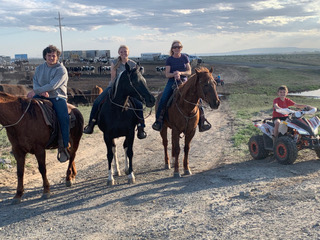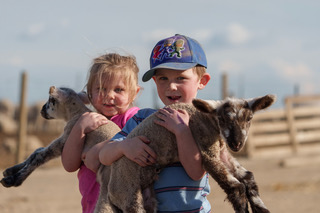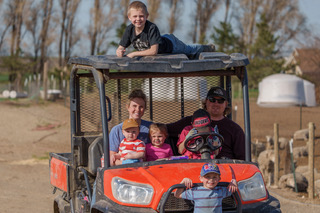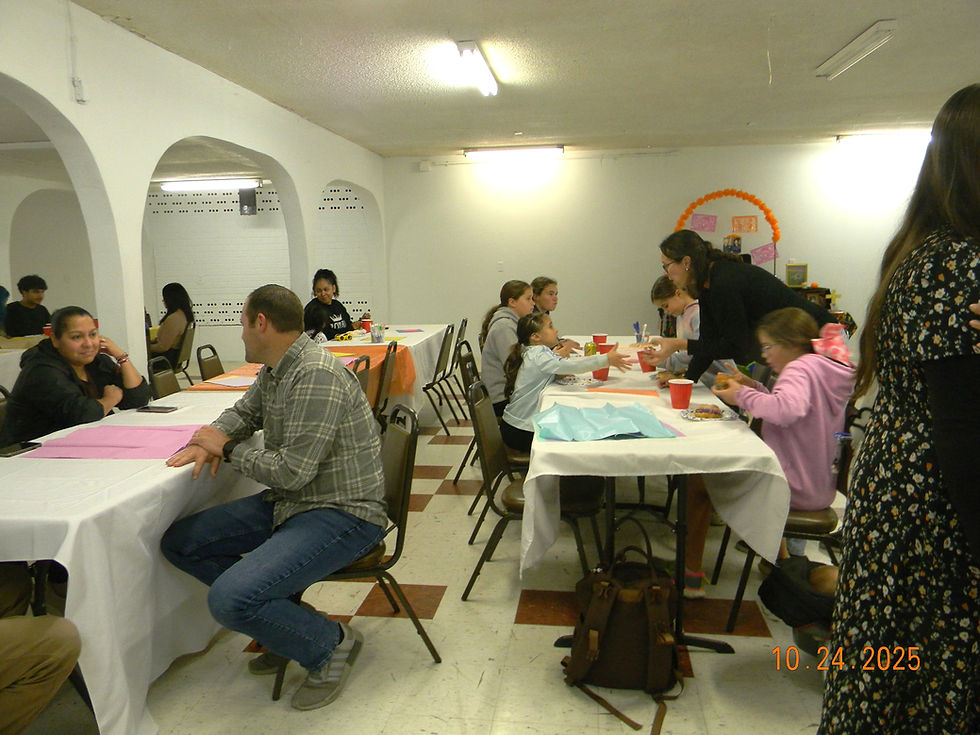Standing O Ranch: family, hard work, and good meat
- Apr 7, 2022
- 5 min read
April 7, 2022
Special Farm Edition - feature story
By: Katherine Trowbridge with Clayton Trowbridge & Krysyan Edler - intern
The Clyde family has seen all aspects of raising cattle from operating a dairy, to ranching, and providing “Beef to table” products. Interestingly, the couple behind the beef operation began their farming journeys raising lambs and dairy cows before meeting. Standing O Ranch all started when Tom Clyde’s parents, Utah native sheep ranchers Bob and Lynette Clyde, moved their ranching operation to Joseph, Oregon before settling in the Columbia Basin in 1983. Tom and his wife Glenda moved here in 1986. At the time, the family was raising sheep and ranching cattle. The beef cattle were sold off in 1990, which allowed for Glenda to introduce her dairy background to the ranch in 1991. In 1998, they started bringing in beef cows again. After 31 years, they made the decision to close the dairy due to regulations and labor. “It’s a lot of hard work and hard to find good help,” they shared.
Tom felt an itching to return to his sheep roots. After all, it was in his blood, so in 2010, they went back to raising sheep. Currently, the ranch has expanded to 925 beef cows and 1500 sheep, which will grow to about 1600 after the lambing season. The six Clyde children were raised working alongside their parents, up at 6 a.m. to feed cattle and later finishing more chores after school. “It’s a good life, to get these kids out away from TV and learn how to work,” Glenda said. “It is a good area for raising a family.”
Their kids, two daughters and four boys, are now raising their own families, yet they still enjoy helping operate the ranch. Ranch life is quite the family affair. Spring is lambing season and on any given day you will find anywhere from one to eight of Tom and Glenda’s grandkids out playing with the lambs in the barn. While their kids are spread out, they tend to come home to help out. Elizabeth lives in Utah, one son lives in Indiana, another son lives Pasco. Boyd, Brett, and Crystal all live nearby. Crystal not only helps with the ranch, she has her own business “Sweets by Keeks,” too, selling freeze dried ice-cream and candies. They’re available in the FCG’s Gift Shop. Glenda shared, “Our grandkids, our kids, daughter in-laws are all out herding sheep. It’s quite a family affair.”
Brett oversees the sheep, the hay grown in Oregon, and the corn grown on the ranch. On the lambing side of the operations, the lambs are sheared in early February, and approximately 45 bags/bales of wool are sold to be used in yarn and other products. Some of the lambs are butchered and sold to restaurants, and they are also willing to sell whole and halves locally, if someone is interested.
Boyd, who handles the cattle, stated, “I’m more in love with the animals than the machinery.” Their product is calves that are sold to feedlots. Some cattle are raised to direct market their meat to the local community. The direct to consumer selling is hampered with regulations and limitations on state inspected and USDA butchers. For USDA, there really isn’t any options in our area. There is talk of loosening up regulations to allow state inspected to sell to individuals, but as of now, it has yet to happen.
Their direct to consumer operation began three years ago when they sold wholes and halves of a few extra animals. About two years ago, they transitioned to selling butcher boxes. They sell assorted boxes with 1/3 consisting of ground beef and 2/3 steak, roasts, briskets, and tri-tips, as well as steak burger boxes and six month subscription boxes, which are discounted and delivered every month . “With Covid, people were more conscientious and wanted to buy local and support local farmers and ranchers.” They deliver boxes direct to consumers every two weeks with drop off and pick-up locations as far as Moses Lake and Spokane, and even direct to door locally.
The genetics and feed make the beef stand out from the competition. They use a nutritionist to put together their feed’s Total Mix Ration, and the calves are grass fed with their mothers. Consumers can taste the difference. Tom and Glenda’s daughter Elizabeth had her friend try the ground beef for the first time. “He said, ‘OMG! This is amazing. Both my wife and I are writing reviews now,’” she said. Boyd prefers a rack of lamb while Brett enjoys a good steak. The Clydes believe their prices are fair based on the quality of product their consumers receive. They don’t want to charge more than they have to, but their meat isn’t like the meat you’d buy at a retailer. “The marbling in meat is basically what makes the flavor. The more marbling, the more flavor and more tender the meat is. We felt there’s a need out there and we were there to provide a good quality, superior product while getting more value for our cattle.”
A large part of the time raising cattle is spent traveling. As there isn’t room to expand, and they don’t want to move away from the area they’ve called home for so many years, they travel to the grazing lands, which is not uncommon in the cattle industry. They are fortunate to be able to rent grazing land at Bailie Youth Ranch in Basin City, but they also truck cattle to Mt. Adams; Mt. Hood; Wallowa County, Oregon; Pendleton; Oregon; and Utah. “We’re on the road a lot. That’s something people may not realize. We need a ranch to raise cattle. We have a farm here,” Glenda said.
They have been all over with their sheep as well - going almost as far as Canada in the northern parts of Montana and to Oakley, Utah. “You put in long hard hours,” they shared. They do have a few employees but much less than they needed when they operated the dairy. They have a sheep herder and a mechanic. Their sheep herder comes from Peru through the H2A program. He is here for three years, then goes back home for three months, and returns for another three years.
There is a seasonal system for raising animals. It all starts in the springtime with lambing and calving season, when the babies are born. The Clydes welcome families to come visit before lambing season ends in about a week. In June, they load up trucks and haul cattle to grazing lands, generally in Pendleton, Oregon. The cattle are left to graze while they come back home to work the farm and tend the sheep. They will make the trek back to check on the cattle once per week from June to October. The Pendleton terrain can be too steep for their eight horses so four wheelers are also used. Grazing lands have their own concerns with bears and wolves that can threaten livestock. The Clydes have invested in their own semi trucks to haul the animals. In the fall, they gather the cattle. Harvest also takes place in the fall with corn being placed in the silo’s. Hay is harvested throughout the growing season and sold with some stored away for feed.
While they work year-round, the question arises, “What do you do for fun?” Brett and Boyd enthusiastically stated, “Rodeo was fun growing up. That was our vacation.” Their dad, Tom, was a national steer wrestling rodeo champion in 1974. Even in their spare time, the Clydes are down to earth and true to their roots.
“All original wealth comes from the earth,” Tom said.
For more information on Standing O Ranch, visit https://www.standingoranch.net/.









Comments